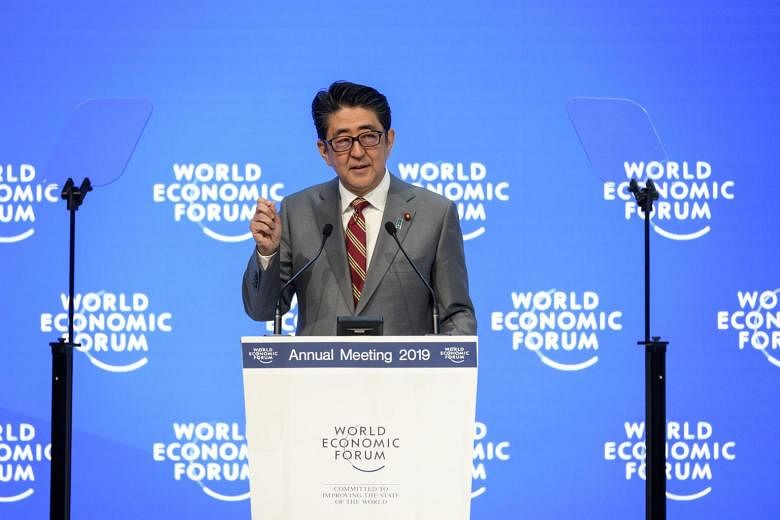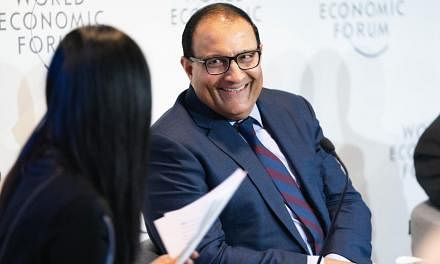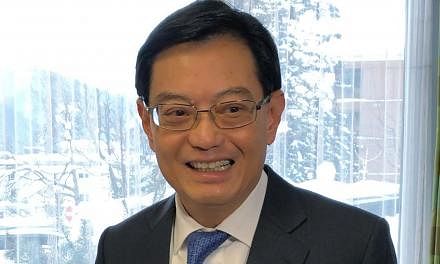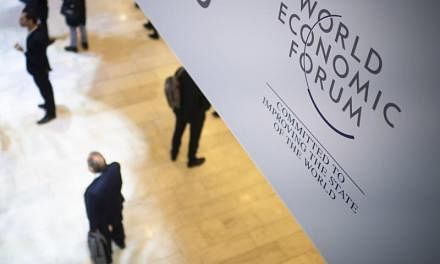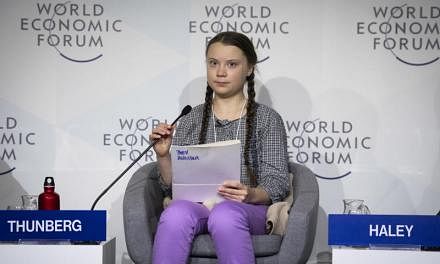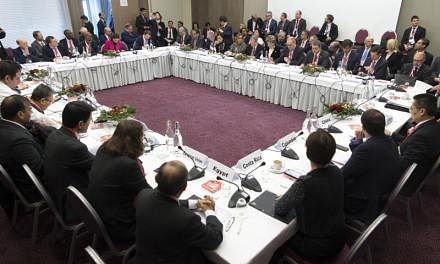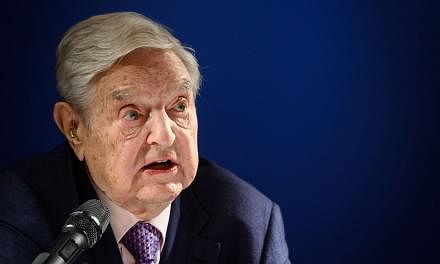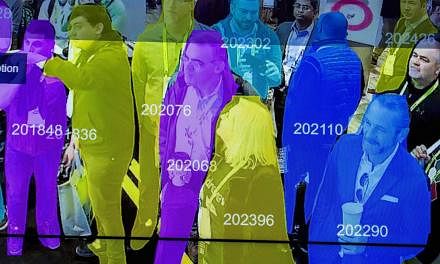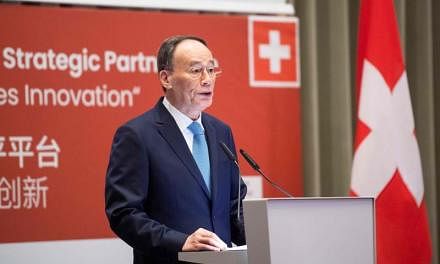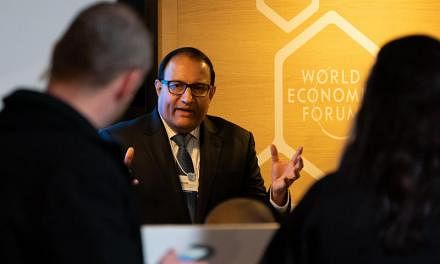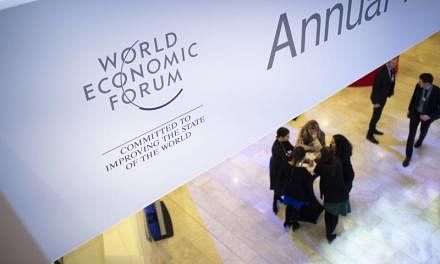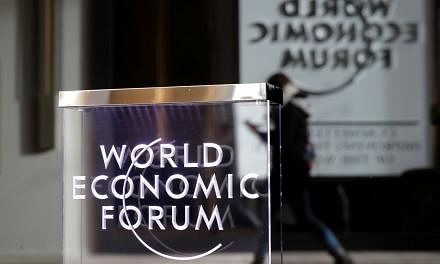DAVOS (NYTIMES) - Leaders of Japan, South Africa, China and Germany issued a series of calls on Wednesday (Jan 23) for global oversight of the tech sector, in a clear signal of growing international interest in seizing greater regulatory supervision of an industry led by the United States.
Prime Minister Shinzo Abe of Japan said his country would use its chairmanship of the Group of 20 nations this year to push forward a new international system for the oversight of how data is used. Data governance will be the theme when the group's presidents and prime ministers gather in June in Osaka for their annual summit.
The emphasis will be on expanding World Trade Organisation rules to encompass trade in data as well as goods and services, he said.
"I would like Osaka G-20 to be long remembered as the summit that started worldwide data governance," Mr Abe said in a speech at the World Economic Forum in Davos.
Mr Abe's proposal was echoed in remarks by other world leaders at the forum.
President Cyril Ramaphosa of South Africa said greater oversight of the tech sector would also be on the agenda of African Union leaders when they meet early next month in Addis Ababa, Ethiopia.
"When it comes to technology, I would support an overarching body that'll set standards on a whole range of things," Mr Ramaphosa said in an interview, specifically mentioning cyber security as a priority.
Chancellor Angela Merkel of Germany called in a speech for a "common digital market" in the European Union. She said international oversight of data usage was needed to head off opposition to the entire tech sector from those who fear the current pace of technological change.
Vice-President Wang Qishan of China also cited a need for more international coordination in oversight of the tech sector, but did not mention personal privacy.
In what appeared to be an oblique reference to the Chinese government's close ties to that country's tech sector, which involves extensive surveillance of civil society, Mr Wang emphasised that each country should also be free to set some of its own policies.
"We need to respect the independent choices of model of technology management and of public policies made by countries, and their right to participate in the global technological governance system as equals," said Mr Wang.
The remarks by the four leaders did not appear to represent a coordinated effort to push forward a new international architecture for oversight of the tech sector. Nor were they consistent in citing which tech sectors might merit further international rules.
There was no consensus on what a global architecture might look like.
The United States has largely deferred to the tech behemoths of Silicon Valley, which have favoured some kind of international understanding among governments on data standards, but want those standards to impose few restrictions on how companies use that data.
European governments have advocated much greater limits on how companies can use data, notably through the European Union's imposition last May of strict data privacy rules, the General Data Protection Regulation.
China has not accepted any limits on the government's ability to access people's personal information. The Chinese government has wide access to electronic communications and employs indoor and outdoor facial recognition and other monitoring and people-tracking technology.
The rapid spread of digital technology in daily life and the implications that has on the future of work and data security will require more international cooperation, not less, Dr Merkel said. But she acknowledged that nobody knows how to write the rules.
Neither the American nor the Chinese approach would work for Europeans, who place a high value on privacy and social justice, Dr Merkel said.
"I still have yet to see any global architecture that deals with these questions," she said.
Mr Abe said Japan wanted to move fast on data governance during its leadership this year of the G-20. But he provided only a general indication of what a new architecture might look like.
"We must, on one hand, be able to put our personal data and data embodying intellectual property, national security intelligence and so on, under careful protection, while on the other hand, we must enable the free flow of medical, industrial, traffic and other most useful, non-personal, anonymous data to see no borders, repeat, no borders," he said.
Mr Abe suggested the world look for a way to broaden WTO rules. The WTO already regulates some kinds of telecommunications services as part of its rule-setting for international trade in goods and services.
Dr Merkel specifically listed the need for ethical standards in artificial intelligence and genetic engineering, and the handling and ownership of data, as three areas that would require particular attention.
An announcement by a Chinese doctor that he had edited the genes of a human baby has stirred international interest in genetic engineering. China has quickly shut down the medical programme that produced the baby, and the doctor himself has been put under guard at a guesthouse at his university in south-eastern China.
Europe, and Germany in particular, have emerged as the de facto regulators of the technology sector, exerting influence beyond their own borders. Berlin's digital crackdown on hate speech, which took effect last year, is being closely watched by other countries.
But if the Continent wanted to continue to take a leading role in shaping international data standards, it would also have to become "an important actor" in the industry itself, Dr Merkel said.
Africa presents further issues for designing any global system for the oversight of data or for the tech sector overall. It has emerged as a tech Wild West, with very few rules, varying by country.
With lavish financing from state-owned Chinese banks under President Xi Jinping's Belt and Road Initiative, Chinese telecommunications companies like Huawei and ZTE have been building extensive mobile phone and data switching networks across Africa. Privacy issues are starting to surface in Africa as well.
Mr Ramaphosa said the African Union needed to act in concert with the international community.
"Africa as a whole should for itself begin to see whether there should be standards that we should all adhere to so that, in the end, we do not have an exclusive type of architecture, which excludes smaller countries, less well-endowed countries financially," he said in the interview.
The Trump administration has imposed increasing restrictions on exports of tech products to China.
The administration has also sought to discourage countries around the world from buying telecommunications equipment from Huawei, particularly for advanced 5G mobile communications networks. It has suggested that Huawei may be linked to Chinese intelligence and to the shipments of American gear to Iran in violation of US sanctions. Huawei has denied these claims.
Canada has detained the chief financial officer of Huawei, Ms Meng Wanzhou, in response to a warrant from the US. The Trump administration is preparing to make a formal extradition request for Ms Meng within the next week.
Mr Wang appeared to push back against the US' overall stance on tech issues.
"It is imperative to respect national sovereignty and refrain from seeking technological hegemony, interfering in other countries' domestic affairs and conducting, shielding or protecting technology-enabled activities that undermine other countries' national security," he said.
